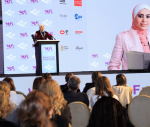You are here
Multinationals ready to jump into Iran market
By Agencies - Jan 17,2016 - Last updated at Jan 17,2016
PARIS — With global growth moribund, multinational firms have been waiting with bated breath for the lifting of international sanctions against Iran for access to a country in desperate need to modernise.
After nearly a decade of limited access to the outside world, many sectors of the Iranian economy need new equipment including the oil and gas industry, railways and airlines.
Plus there are 80 million Iranian consumers, many of them keen to buy cars and other goods.
Delegations of officials and business executives from Germany, France and Italy have headed to Iran to prepare the ground to win back some of the market share lost to emerging nations like China and Turkey, or countries like Russia and Japan which kept friendly nations with Tehran.
Germany's BGA foreign trade federation believes that country will have a difficult time reclaiming its former status as Iran's largest trade partner as Chinese firms have swooped in during sanctions.
Deputy Foreign Minister Zhang Ming of China, the top buyer of Iranian crude, said during a recent visit that Beijing intends to fully exploit the potential for cooperation with Tehran in the manufacturing sector and construction of infrastructure.
US companies like Boeing and General Electric are also interested by the opportunities in Iran, but are handicapped by the fact Washington has not had diplomatic relations with Tehran for 35 years and will keep certain sanctions in place.
Meanwhile, the Iranians are looking for foreign firms to help modernise the country's infrastructure, which has suffered from a lack of investment and technology as the economy was largely cut off from the outside world for the past decade.
A resumption of trade should also help put the Iranian economy, which suffers from high unemployment and hyperinflation, back on its feet.
Oil sector still attractive
The slump of global oil prices to under $30 per barrel, partially due to expectations of Iranian crude flooding back onto markets, is not good news for Tehran as it means less money flowing into government coffers.
Nevertheless, with the country holding the world's fourth-largest oil reserves and currently pumping a million barrels per day less than it did before sanctions, the Iranian energy sector is still attractive for foreign firms and Tehran is looking for $25 billion in investment in the oil and gas sectors.
"The infrastructure and energy sectors offer the best opportunities for our firms," Italy's economic development ministry said recently.
Russia, which has maintained close relations with Iran, has a leg up on the competition and is willing to put money on the table to achieve its goal of boosting its annual trade turnover with Tehran from $1.6 billion currently to $10 billion.
Russian President Vladimir Putin offered to open up a $5 billion credit line to Iran during a visit to Tehran in November.
Not only has Russia recently sold long-range S-300 surface-to-air missiles to Iran, but it has received orders to build two new reactors at the Bushehr nuclear power plant.
State-owned Russian Railways is after work electrifying Iranian rail lines.
Russian gas giant Gazprom and the country's number two oil firm Lukoil are looking not only for production opportunities, but to stocking and transporting energy as well.
Certain Western oil companies, like France's Total and Italy's Eni, are after joint venture contracts where their Iranian partner will retain majority control.
"We will be well placed to examine the opportunties in the gas, oil and petrochemicals and fuel distribution sectors, but all of that will be subject to good contractual conditions," said Total's Chief Executive Patrick Pouyanne recently.
'Promising market'
The automobile sector is also attractive as the rate of car ownership in Iran is just 100 per 1,000 people, six times less than in Europe, and consumers have had limited access to new vehicles under Western sanctions.
France Renault has already negotiated a minority stake in Iranian auto manufacturer Pars Khodro, according to Iranian officials.
"Iran is a very promising market," Renault Chief Executive Carlos Goshn said on the sidelines of the Detroit auto show last week. "Today, it's more than 1 million cars, it has the potential to go to 1.5 or 2 million."
In the food and agriculture sector it may be harder going due to the "strong involvement of public firms and semi-public owners of farm land", according to a French agriculture ministry report.
Germany hopes it will be able to export 5 to 10 billion euros of goods to Iran in the coming years, in particular machine tools.
Siemens has already announced a preliminary deal with Tehran to improve rail infrastructure.
Iranian President Hassan Rohani has scheduled a visit to Italy and France at the end of January.
That could prove beneficial for Airbus, which is based in the southern French city of Toulouse, as Iranian airlines need to renew their fleet of aircraft.
Iran "...is potentially a huge market for Airbus and our competitors", Airbus Chief Executive Fabrice Bregier was quoted as saying recently by the Financial Times, adding the company had already made some contacts.
Separately, German industry expects a steep rise in exports to Iran following the lifting of international sanctions, and Economy Minister Sigmar Gabriel said on Sunday he would seek to drum up trade on visit Tehran in early May.
"That was faster than expected," said Reinhold Festge, head of German engineering trade group VDMA, adding that now diplomats had delivered it was the turn of companies and banks to seize the new opportunity.
For decades before sanctions were imposed, Germany was Iran's biggest trading partner. The gap in Iranian imports from Germany and other Western countries has largely been filled by Chinese, Korean and Middle Eastern competitors.
Germany's Chambers of Commerce and Industry (DIHK) said it expected exports to Iran to double to 5 billion euros ($5.5 billion) in the coming years and reach twice that figure in the long term.
This could compensate, at least partially, for waning demand for German goods from China, Russia and other emerging markets.
"German companies have lost important market share in Iran. We must revive German-Iranian ties as quickly as possible," DIHK head Volker Treier said.
Gabriel, who led the first top level German government visit to Tehran in 13 years in July, will head back to Iran in early May to co-chair an economic conference with his counterpart Ali Tayyebnia.
The revival of trade will take some time, but the lifting of sanctions provide a sound basis for this, Gabriel said in a statement on Sunday. "This gives us the opportunity to open a new chapter in German-Iranian trade ties."
German machinery, auto, chemicals, healthcare and renewable energy firms are likely to be the biggest beneficiaries of the opening up of the Iranian market.
The VDMA engineering trade group plans to open an office in Tehran in the first half of this year to help companies sell machinery in Iran.
Tehran has already announced plans to buy 114 civil aircraft from Franco-German manufacturer Airbus, a deal possibly worth more than $10 billion at catalogue prices.
Last week, Siemens signed deals to work on Iran's railway infrastructure while Daimler announced plans for its commercial vehicle division to return to Iran.
Related Articles
German companies are hoping to win billions of euros worth of business from Iran after world powers reached a preliminary nuclear accord with Tehran, and Germany's engineering body urged banks to revise their business policies towards Iran.
FRANKFURT/BERLIN — Martin Herrenknecht, founder of a company in southern Germany that is a world leader in tunnel-boring equipment, has been
DUBAI — Iran ordered a steep increase in oil output on Monday to take immediate advantage of the lifting of international sanctions, and som
















